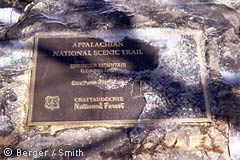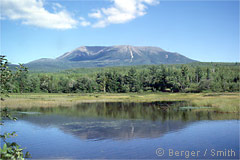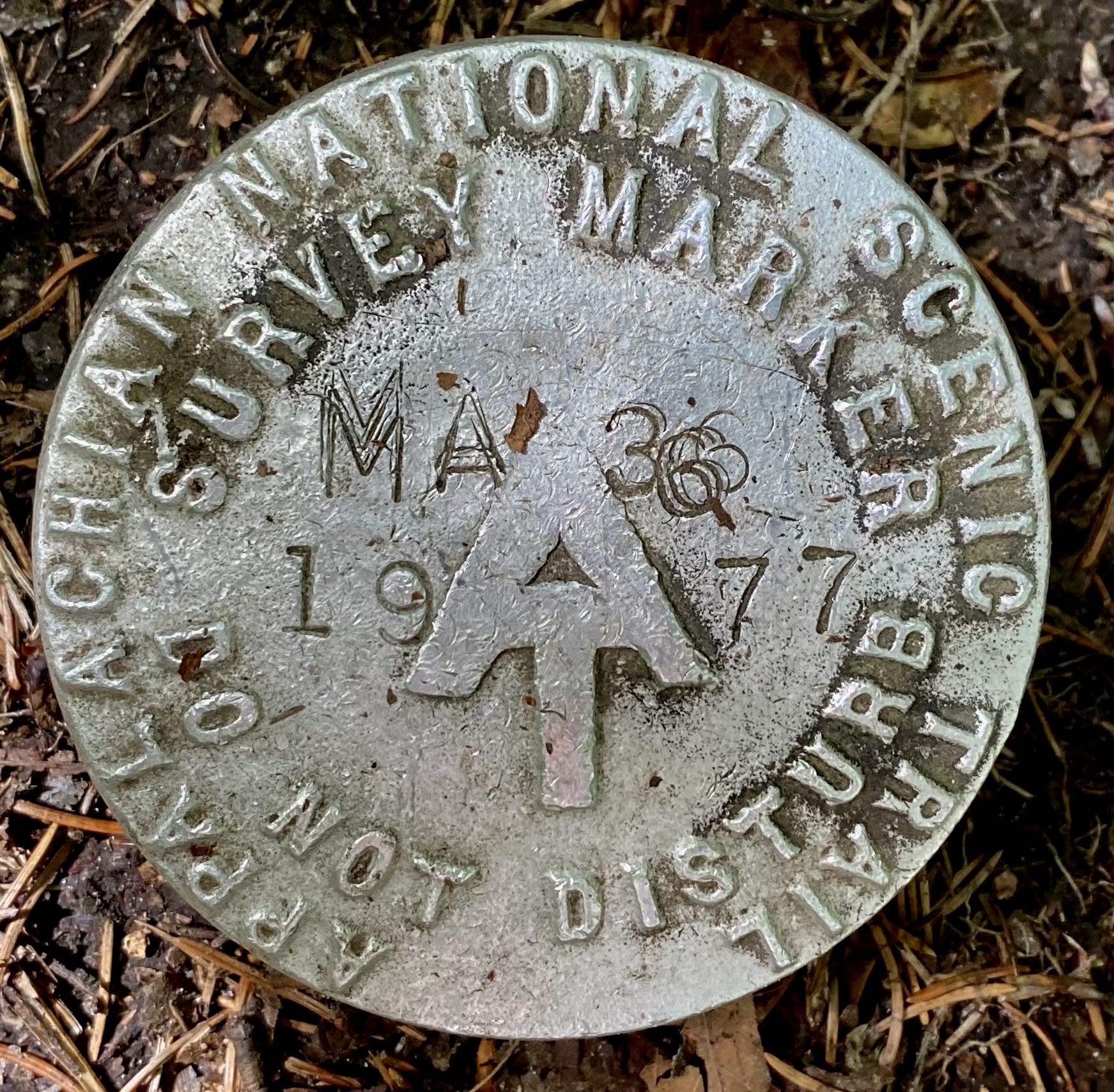 |
| The plaque at Springer Mountain. |
Thinking of hiking the Appalachian Trail? (That’s “AT” to those in the know). It’s not enough to walk the walk; you gotta talk the talk, too.
Here’s some lingo you’re going to be hearing for the next, oh, five or six months.
(The following list is mostly directly related to the Appalachian Trail; I didn’t include “regular” hiking terms. If you’ve got some to add, please put them in the comments section below this post!)
On the Trail
- Lean-to: (Also called a shelter): A primitive three-sided structure for sheltering hikers. First come first served, and the ethos is to squeeze as many in as possible, especially in bad weather.
- Stealth camping: Camping in such a way that you can’t (easily) be seen. It doesn’t necessarily mean camping illegally — but it sometimes does.
- Water bars: Stone bars that help channel; water off the trail.
- Double blazes: indicate a change of direction.
- Relo: A change in the route of the trail: Can be temporary or permanent.
- PUDs. Pointless ups and downs. Many blue blazers (see below) try to avoid PUDs.
Trail Folk: Who We Are
- SoBo and NoBo: Southbounder and northbounder; indicates a hiker’s direction of travel.
- White blazer: A hiker who assiduously follows the exact, official marked (white-blazed) route of the Appalachian Trail.
- Blue blazer: A hiker who takes alternate routes, such as old AT routes that have since been relocated (often marked in blue); often blueblazers are blueblazing to avoid PUDs..
- Yellow blazer: A hiker who “cheats” by hitchhiking (following the yellow marks on a highway).
- Purist: A hiker who white blazes. often expresses a critical attitude about people who blue blaze, and let’s not even talk about yellow blazing.
- Triple Crowner: A hiker who has completed the Appalachian, Pacific crest, and Continental Divide national scenic trails.
- Hiker trash: What we all affectionately call each other when we’re covered with grime and headed for the nearest bar.
- Thru-hiker: Yup, we spell it wrong. We’re into the lightweight thing; we get rid of stuff (like letters) we don’t need.
- Section-hiker: Hikers who hike the entire Appalachian Trail over a stretch of several or many years.
- 2000-milers: Anyone who has hiked the entire AT.
- End-to-Ender: Same as above.
Thru-Hiking Gear and Stuff
- Ultralight: A style of hiking where gear is chosen according to weight; the goal is the lightest pack possible.
- FSO: From-the-skin-out: A measure used by weight-obsessed ultralight hikers to account for every ounce they carry, right down to their underwear.
- Hiker box: A box maintained in some hostels or other trail service providers where hikers can donate food and equipment they no longer need to those coming after them.
- Flyer: A box of supplies you mail to yorself, to a location farther up the trail.
- Mail drops: Boxes you prepackage when still at home and bribe a friend or family member to send to you at various post offices and hostels along the way.
- Resupply: Going into town to get more food, pick up your mail drops, or stock up or repair gear.
- Vitamin I : Ibuprofen: What you need to carry all that stuff.
Trail Culture
- Trail Daze: Hiker variation of Trail Days, the annual town festival in Damascus, Virginia, which brings hundreds of current and former thru-hikers into town.
- Ruck: A ruck is technically an informal gathering, but in recent years, informal gatherings have become scheduled events at various places along the trail.
- Register: A notebook left in a lean-to, trail head, or hostel, where hikers record pretty much whatever they want to. it’s the hub of the non-digital hiker communication system.
- Taking a zero: (zero-mile day): Taking a full day off in town or on the trail, where you do no hiking at all. (A “Nero” is a “nearly zero” day.)
- Getting off: The polite way to say someone is quitting their thru-hike, the implication being he may get back on.
- Flip-flopping: Continuing to hike the trail, but driving to another location and resuming hiking in a different direction. (“He was going NoBo, but he’s going SoBo because he realized he’d never make it to Katahdin in time, so he flip-flopped.”)
- Slackpacking: It used to mean hiking at a leisurely pace, but on the AT the term has gotten commandeered to mean hiking without a pack (by getting someone to deliver it ahead for you).
- Yogiing: Good naturedly trying to get day-users to give you food or drinks without actually asking.
- Yoyoing: Doing back-to-back thru-hikes of the A.T., one in each drirection.
- Trail name: It’s like a truck driver’s “handle.” You can try to name yourself — or you can “acquire” a name on the trail. (Do that at your own risk!)
Trail Communities
 |
| Katahdin, the northern terminus. |
- Trail towns: Towns that are very close to the trail and are popular re-supply and rest stops because they have what hikers need and/or are especially friendly to hikers.
- Ridge runner: Usually a paid summer position in crowded sections of the trail: Think of them as A.T. rangers.
- Maintainer: Volunteers who keep the trail cleared of blowdowns (downed trees), cut down widow makers (hanging branches) and build puncheons (bog bridges).
- Trail magic: The serendipity of meeting someone on the trail who offers hospitality or help, usually when you need it most.
- Trail angels: Purveyors of trail magic.
- Hike your own hike: What we tell each other to let people make their own decisions about whiteblazing, flip-flopping, and other crucial issues of the thru-hiking world.

Of course, Hike your own hike is usually abbreviated as HYOH
Possibly add: AYCE, all you can eat
A “flyer” was always called a ” bounce box” when I was on the trail.
We commonly referred to ibuprofen as “trail candy”
To “Pull a Snakie” refers to a hiker stoping to “shed” a layer of clothing because he or she has built up too much heat.
My favorite term is Red Blazing – falling off a mountain and leaving a streak of hide behind… 🙂